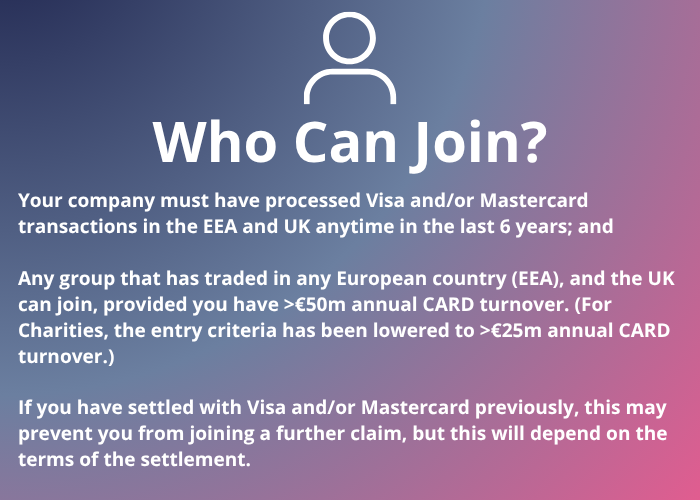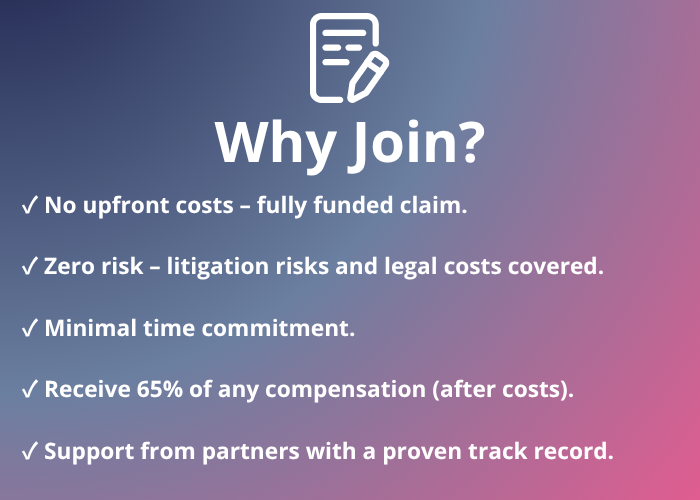Claim back overpaid interchange fees from Visa & Mastercard

What is this claim?
- The claims are for damages on behalf of businesses and organisations trading in the EEA and UK that have accepted Visa & Mastercard credit and debit cards.
- Seeks compensation for Multilateral Interchange Fees (MIFs) charged by Visa & Mastercard.
- Based on long-established EEA and UK competition rulings, we allege that these fees are anticompetitive.




“Any multi-national group, with business in the UK, who has not yet settled, should reach out. Our clients tell us it’s a no-brainer to join this fully-funded group”
Neil Fillbrook FCII, Group CEO, BB Merchant Services
Who is behind the claim?
- Funded by Bench Walk Advisors, an international litigation funder with $1.2 billion committed to cases to date. They are the litigation funder of the year 2025, funding the class action, covering legal costs and risks, ensuring merchants can participate with no financial exposure.
- Legal support from Hausfeld, a global law firm with a strong track record in complex commercial, and group litigation. With offices across Europe and the US, the firm has secured major settlements for businesses through high-profile collective actions and landmark cases worldwide.
- Payments expertise from BB Merchant Services, who previously supported the two largest UK claimant groups against Visa & Mastercard to-date – both securing major pay-outs for all the clients. BB Merchant Services is arguably the leading benchmarking and renegotiation services consultancy firm in the world.



FAQs
1. What do the claims relate to?
The claims concern ‘multilateral interchange fees’ (“MIFs”) set by Visa & Mastercard in respect of all transactions on all types of Visa & Mastercard credit and debit cards. Different transactions incur different fees, as outlined below:
- Domestic consumer MIFs – where a cardholder uses a card in the country in which it was issued, e.g. a consumer with a card issued in the UK uses that to pay for something in the UK.
- Inter-EEA MIFs – where a cardholder uses a card issued in one EEA in another EEA country, e.g. a consumer with a card issued in the Netherlands uses that to pay for something in Belgium.
- Interregional MIFs – where a cardholder uses a card issued outside the EEA country in an EEA country, e.g. an American tourist with a card issued in the United States uses that to pay for something in Italy.
- Commercial card MIFs – where a commercial/corporate card is used to make a payment.
MIFs are charges imposed by the card schemes (Visa & Mastercard) that are paid by the merchant’s bank (referred to as the acquirer or acquiring bank) to the cardholder’s bank (referred to the issuer or issuing bank). The fees are passed on by the acquiring bank to merchants through the ‘merchant service charges’ (known as MSCs) that acquiring banks charge to merchants for processing card payments.
In its judgment of 27 June 2025, the Competition Appeal Tribunal (the “Tribunal”), the UK’s specialist competition court, in the first trial of the Merchant Interchange Fee Umbrella Proceedings, found that the above MIFs infringed EU competition rules, specifically Article 101(1) of the Treaty of the Functioning of the European Union (“TFEU”). The Tribunal determined that such infringements occurred either ‘by object’ – where the conduct is inherently anticompetitive – or ‘by effect’ – where the conduct has an actual restrictive impact on competition. The judgment can be accessed here. Other issues have been and are to be discussed in further trials.
The claims are for damages on behalf of businesses and organisations trading in the UK and EEA that have accepted Visa & Mastercard credit and debit cards and therefore paid MSCs which are largely comprised of MIFs.
2. How much will bringing these claims cost?
The solicitors acting for the claimants, Hausfeld & Co LLP, will enter into a litigation funding agreement with Bench Walk Advisors, a professional litigation funder, who will pay all the costs of the litigation while it is ongoing. There will consequently be no fees to be paid by claimants while the litigation is underway.
If the claims are successful, the claimants will pay 35% of damages recovered through trial or settlement, plus any applicable VAT. This will be paid under what is known as a damages based agreement (“DBA”) with Hausfeld, which Hausfeld will then share with the litigation funder.
For completeness, we note that claimants may incur some ‘internal’ costs, in terms of the internal resources that they may need to dedicate towards providing documents to be disclosed in the proceedings and, in some instances, adducing written and/or oral witness evidence in the proceedings. This is addressed further under the question “How much time and effort will be required?”.
3. What happens if the claims are not successful?
The general rule in litigation in England and Wales is that the loser pays the winner’s costs in the litigation (at a level the court determines to be reasonable and proportionate), in what is called an ‘adverse costs award’. This applies both to the ultimate loser of the case at the end, but also to some hearings that may take place during the litigation, called ‘interlocutory’ hearings.
The litigation funder will arrange and fund the cost of special insurance, called ‘after the event’ (“ATE”) insurance, to meet any adverse costs awards. That means that, in practice, the claimants within the group will be insulated from having to pay any costs to the card schemes which may arise during the litigation. The ATE insurance will not cost the claimants any extra amount; the premiums are accounted for in the 35% fee that the claimants will pay on success.
4. Who will be conducting the claims on the claimants’ behalf?
Hausfeld will be the solicitors litigating the claims, working with specialist barristers. Hausfeld is renowned in the field of competition and group litigation, with extensive experience in a broad range of competition cases. Specifically, it has represented numerous claimants in proceedings against Visa & Mastercard in respect of interchange fee claims, including in the Umbrella Proceedings, and has successfully negotiated settlement agreements with these defendants on behalf of these claimants. Hausfeld is ranked as Band 1 for both Competition Law and Group Litigation in the Legal 500 and Chamber UK 2026 rankings.
The Hausfeld team will be led by Anthony Maton, Belinda Hollway and Tim Brown, who collectively have decades of experience in competition litigation as well as dispute resolution more broadly. They also have extensive experience in litigating against Visa & Mastercard, having represented scores of merchant claimants in the history of interchange fee litigation. This has included representing large groups of merchant claimants and successfully negotiating the settlement of their claims with Visa & Mastercard.
Through its extensive experience in litigating against Visa & Mastercard, Hausfeld also has many contacts with barristers and economic experts who are equally well-versed in interchange fee litigation and whom Hausfeld intends to instruct in connection with the claims.
5. Where will the claims be brought and why?
The claims will be brought in England. The primary reason for using the English courts is that there is already considerable helpful precedent in England about interchange fees, including most recently that interchange fees are prima facie anticompetitive in breach of Article 101(1) TFEU. Another judgment on the issue of ‘pass-on’ is due imminently. These judgments are explained further under “What are the Merchant Interchange Fee Umbrella Proceedings?” below. By bringing the claim in England, claimants can take advantage of the English court’s familiarity with interchange fees and the fact that many key issues have already been determined (largely favourably to merchants).
6. Will claimants be in a larger group and what effect does this have on the litigation?
Yes. All claimants who sign up by 16th January 2026 will be included on the same claim form (or forms, if we file separate claims against each of Visa & Mastercard).
This means that the entire group’s claims will be run together, providing economies of scale and efficiencies for all claimants.
7. When will the proceedings be filed?
We anticipate filing the claims in early 2026.
Please be aware that because the period of time for which you can claim is likely to be linked to the date on which we file, any delay while we build a group with this critical mass may lead to you forego damages that might otherwise be available if we filed a claim earlier. For example, if we file in January 2026, you may be able to claim back to January 2020, whereas if we file in November 2025 you might be able to claim back to November 2019.
8. How far back can we claim?
Under English law, you can claim back for interchange fees paid for the six years prior to the day on which the claim is filed.
To the extent that a part of your claim may be governed by the law of one or more EEA Member States, for example in relation to MIFs paid in EEA Members States, the limitation periods may vary and may be longer or shorter than six years. In general, however, the courts are likely to allow you to claim for interchange fees paid for at least five years back from the date of filing.
9. How much are the claims worth?
The value of each business’ claim will depend on the volume of relevant Visa & Mastercard transactions it has accepted and, consequently, the value of the interchange fees that they have been charged on each transaction (with these fees depending on the transaction type).
The expert data analysts that Hausfeld will instruct in relation to these claims, who have extensive experience in processing interchange fee data, will be able to use each business’ acquiring data to calculate the value of their claims.
The acquiring data can be requested from the merchant’s acquiring bank. This is something that BBMS and the legal and expert team can assist with, once we are authorised to liaise with your acquirers on your behalf.
10. Can a business bring further claims even if it has settled a claim against Mastercard and/or Visa previously?
This depends on the scope and terms of the settlement agreement that a business has with Visa & Mastercard. If any member of your corporate group has settled with Visa & Mastercard in any jurisdiction, the previous settlement terms should be considered before any new action is commenced.
Hausfeld would be happy to discuss the potential scope of the settlement agreement with you, including whether this might preclude any further claims by the merchant against Visa and/or Mastercard. Settlement agreements will have confidentiality clauses which generally prohibit the agreements from being shared with third parties. These do not usually extend to prohibiting a settling party from sharing the agreement with solicitors it has instructed, but this should be checked either by your in-house legal team or the lawyers who acted for you in the settlement before any settlement agreement is shared with Hausfeld.
11. How long will the proceedings last?
It is not possible to say exactly how long the proceedings will last. However, they can be expected to last for at least several years given the complexity and history of interchange fee litigation and the issues that have yet to be tried in the Umbrella Proceedings.
However, Visa & Mastercard have settled a very large number of interchange claims, including claims brought by large groups of merchants. It is quite possible that the claims could be settled prior to their conclusion.
In Hausfeld’s experience, the prospects of settling on favourable terms with Visa & Mastercard are improved by merchants’ involvement in active litigation, as opposed to merely having stayed claims on file against the defendants.
12. How much time and effort will be required?
Hausfeld will manage the day-to-day running of the case, including preparations for any hearings and the filing of court documents. Claimants will therefore have limited involvement in this regard. However, claimants’ input on major decisions – such as in settlement discussions, appealing any decisions of the Tribunal, and so on – will be required. Claimants may be required to complete a survey responding to questions to gather data that the experts want for Trial 3. Based on the previous surveys in the Umbrella Proceedings, these are likely to be short and relatively straightforward to complete.
Claimants may also need to disclose certain documents and data in the proceedings. Hausfeld anticipates that disclosure from at least a sample of the claimant group will be required; such claimants will have to dedicate internal resources to identifying and collating relevant documents for Hausfeld to then review and disclose to the other parties in the proceedings. It is not currently possible to identify the exact types of documents that may need to be disclosed, however Hausfeld anticipates that interchange and merchant service fee spend data and claimants’ contracts with their acquiring banks may be required. As explained above, claimants can generally authorise BBMS, Hausfeld and the experts to contact their acquiring banks to gather this information on their behalf.
A sample of the claimant group may also be required to provide witness statements and potentially oral evidence at trial, where they would be cross-examined by counsel for the card schemes. Certain individuals at each claimant business may therefore be required to engage in conference calls with Hausfeld to adduce such witness evidence and to sign off on witness statements to be filed with the Tribunal.
Hausfeld strongly advises that any businesses considering signing up to these claims ensure that employees are provided with a document preservation notice, to preserve all historical documents and records that may be relevant to the proceedings. We will provide a template document preservation notice once we have been formally engaged by the claimant in question, which can be shared with relevant individuals, and we can liaise with the claimant’s IT department regarding preservation steps required for IT equipment and systems.
13. Why should a business bring these claims?
Competition authorities and courts in the EU and UK have found that the MIFs described above are anticompetitive (although there are still certain legal avenues available to Visa and Mastercard to seek to defend the fees which remain to be tested before the Tribunal). Bringing these claims is a way of compensation for these losses and redress in respect of the harm that has been suffered.
14. Should a business be worried about the commercial consequences of joining the claims against Visa or Mastercard?
Businesses should not be concerned about the commercial consequences of joining the claims against Visa and/or Mastercard. Thousands of companies have brought claims against Visa & Mastercard, and the extensive history of interchange fee litigation demonstrates that this is a common means of seeking redress that companies have not found to have adverse commercial consequences. Additionally, the claims will be against the card schemes rather than businesses’ acquiring banks, meaning that businesses’ direct relationships with their acquiring banks should not be affected by the litigation.
15. How are interchange fees anticompetitive if they have been set in accordance with the European Union’s Interchange Fee Regulation 2015 (the “IFR”)?
While various legal arguments remain open to the card companies and are still to be litigated, the Tribunal noted in its Trial 1 judgment that the application of the IFR “should be without prejudice to the application of…competition rules”, meaning that the IFR therefore does not operate as “an exemption decision for competition law purposes”.[1] Thus, it has been possible for the Tribunal to find that interchange fees governed by the IFR – namely consumer credit and debit interchange fees – are anticompetitive in spite of the caps imposed by the regulation. For the avoidance of doubt, commercial and interregional interchange fees are not capped by the IFR, so this issue does not apply to those fees.
